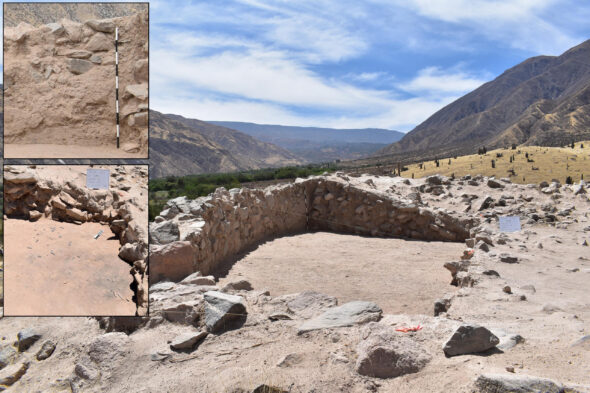1,200-year-old temple discovery in Peru
At the southern Peru site Pakaytambo, a team led by a University of Illinois Chicago archaeologist has discovered a temple built 1,200 years ago by the Wari Empire (A.D. 600-1000).
As reported in the Journal of Anthropological Archaeology, the D-shaped temple was built on top of a large, monumental platform with adjoining structures that would have housed Wari religious officials and people linked to the Wari Empire.

The Wari controlled large parts of present-day Peru, relying on various tactics ranging from direct force to the expansion of trade routes, according to David Reid, UIC postdoctoral research associate in anthropology and the study’s author.
“One of the most effective ways of bringing people into the empire was through shared beliefs and religious practices,” Reid said. “Open plaza spaces associated with the temple complex at Pakaytambo would have allowed local communities to participate in ritual gatherings organized by the Wari.”
He also notes that such ceremonial events would have been critical in maintaining political authority across great distances of the Wari Empire.
During the Middle Horizon period over 1,000 years ago, Pakaytambo was strategically established on a prehistoric transit route at an important ecological and political location between the foothills of the Andean highlands and adjacent coastal valleys of Arequipa.
This is one of several recent finds of Wari D-shaped temples across Peru, where Wari state expansion and influence previously were unclear.
Assistance with the field and laboratory research was provided by Kevin Ricci Jara, Miguel Vizcarra Zanabria, Veronica Rosales Hilario, Angel Infantes Mendoza, Yoni Pumacahua Cangana, Rachael Penfil, Katherine Moore, Elizabeth Olson and Lidia Betsabe Camargo Padilla, co-director of the Proyecto Arqueológico Caminos Preincaicos Arequipa.
The research was financed with support from the Wenner-Gren Foundation and the National Science Foundation (Doctoral Dissertation Research Improvement Award No. 1854651). All excavations and subsequent laboratory analyses were approved by the Peruvian Ministry of Culture.
